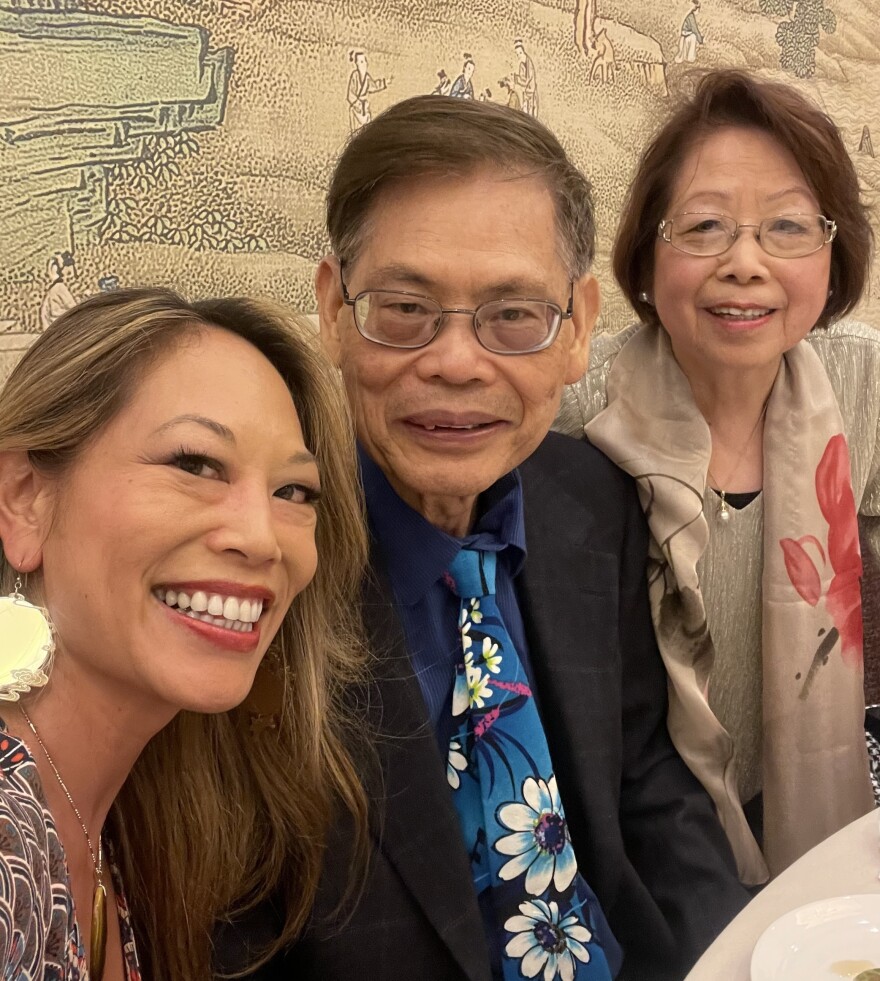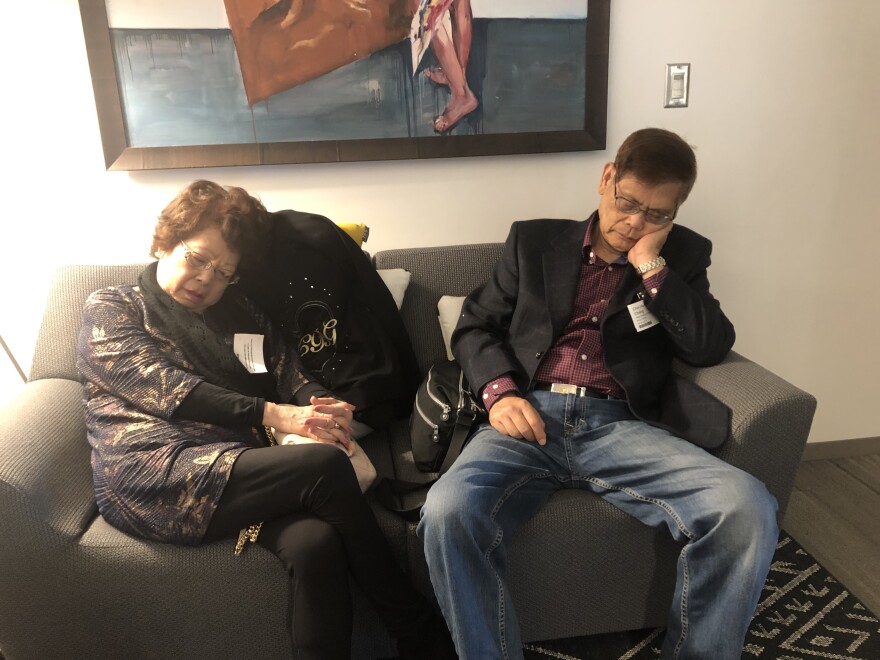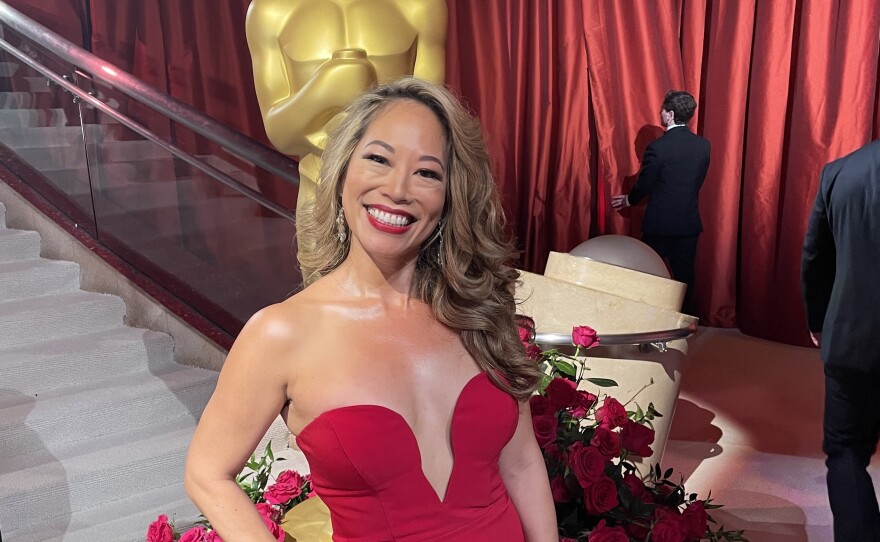Faces Of NPR showcases the people behind NPR--from the voices you hear every day on the radio to the ones who work outside of the recording studio. You'll find out about what they do and what they're inspired by on the daily. This month, we feature NPR's Asian American and Pacific Islander community. First up is Ailsa Chang.
The Basics:
Name: Ailsa Chang
Title: Host of All Things Considered
Twitter Handle: @ailsachang
Where are you from?
I grew up in the San Francisco Bay Area, in Los Altos, California. I went to Mountain View High School – go Spartans!
What does it mean to you that you're the first Asian American woman to host an NPR show?
It means a lot to me. It has always meant a lot to me – ever since I became a host in 2018. What's changed is how much I talk about this out loud now.
I've given this a lot of reflection lately. When Lulu Garcia-Navarro became host of Weekend Edition in 2017, it was openly celebrated that NPR now had its first Latina host. I was so happy to see NPR finally take that step. But when I became host of All Things Considered the very next year, there was almost no mention that I was the first Asian American woman to host a news magazine show at NPR – almost zero mention of that within NPR, or outside of NPR. I noticed that immediately, and I didn't speak up. I didn't speak up to remind people that having an Asian American woman host was a breakthrough, too.
And I feel guilt about not speaking up earlier about it. It's almost as if I internalized the invisibility that a lot of Asian Americans feel. Too often, we're in this other box – the unseen minority, the assimilated minority. Don't even get me started on how corrosive I think the Model Minority Myth has been for Asians, and how it's served as a wedge pitting communities of color against each other. One of the myth's most pernicious effects is that when Asians do make advances, there's sometimes this feeling that it doesn't count as much – because we were supposedly doing fine anyway. But we're not. So many Asians don't feel safe in this country. How can we, when anti-Asian hate crimes have been on the rise? When a huge portion of our population still struggles with poverty? We are still made to feel different.
I'm now giving myself permission to let this part of my identity seep into the way I approach my work as a journalist. It's been an evolution. During my early days in journalism, race was not a driving factor in how I pitched or shaped stories. I didn't let it be, as if that were in service of some impartiality ideal in my head. But I think our stories are richer when they're informed by the lived experiences of the people who write them.
That said, I'm not just Asian American. I'm many things. I'm Chinese. I'm Taiwanese. A child of immigrants. I'm a woman and a former lawyer who happens to be a Californian. All of that, and more, informs who I am as a journalist.
At what moment did you realize journalism was your thing and that you're good at it?
This whole journalism thing was a surprise. I had always been convinced that I was meant to be a lawyer. I was a total speech and debate nerd, I loved arguing and I hated bullies. I wanted a job that gave me the ability to fight bullies.
But somehow, I ended up at a big law firm. And it was such a bad fit for me. Law firm life didn't access the parts of my personality that I loved most – like the part of me who wants to follow her curiosity freely, who loves getting to know people from all walks of life. I felt like a total misfit there.
So I ran. But I ran away from the law firm – NOT towards journalism. I found journalism by accident.
I spent a few months unemployed in San Francisco, where I was living at the time. And that got pretty depressing and lonely. Because I had no plan for where I was going next and I'm someone who needs somewhere to go each day, I signed up for an unpaid internship at KQED just to get out of the apartment and be with people. Not because I was even remotely thinking about getting into journalism. I just thought maybe a mentally healthy thing to do was to be around people who sounded smart and compassionate and interested in the world.
So I get to KQED — and remember, I was in my early 30s at this point — and my co-interns were still in college. They were like a decade younger than me. And they thought it was so strange and hilarious that I was answering the phones with them.
But I really thrived in that internship.
I was a booker – I pre-interviewed potential guests and prepped the hosts on various topics. It was WILD to me that I could just research something one day, write a bunch of prep on it, and then switch topics the next day. Like, in litigation, you could be stuck on a case for years – even if it's boring as hell. In journalism, you have no business staying on a story for years that's boring as hell. It was liberating.
And I loved the whole enterprise of getting people to open up. I got the sense that if I did the research, asked the right questions, approached people with the right tone and with total curiosity, really cool things would come out of their mouths. I loved that feeling of helping people be their most interesting selves. So I decided I'd go back to school – to figure out the basics of how to do this journalism thing.

Do you find that any of the skills you got from practicing law were transferable to journalism?
Absolutely. All the time. In both professions, you have to be able to take an enormous amount of facts and distill them into a compelling narrative. You have to be able to poke holes in people's arguments and spot logical inconsistencies. You have to be comfortable dealing with contentious people. Also, both lawyers and journalists have to be able to anticipate counterarguments. Like when you're writing a legal brief, you're always thinking about what the other side might argue, so you deal with their anticipated argument at the outset. When you're writing a news story, you have to anticipate what voice could end up getting left out or mischaracterized, so you seek out opposing viewpoints to round out how you represent a set of facts. In both professions, you need to constantly interrogate your own blindspots.
But most importantly, the fundamental values of the legal profession and the journalism profession overlap so much. Being a lawyer, to me, is supposed to be about being a guardian for what is right. It's a profession that seeks to hold power accountable, that seeks to expose injustice, that seeks to interrogate the truth. Those are the values of law. And those are also the values of journalism.
Do you find that this work gives your life meaning/purpose?
I feel so incredibly lucky to have this job. I get paid to learn about the world every single day. What other job is like that? I get to go up to almost anyone I want and ask them, "What is it like to be you? Tell what you think. Tell me what you feel." This job is a privilege.
And look, finding meaningful work is itself a privilege. I realize this. But if you do have the privilege to choose your work, find work that is an extension of who you are. We spend so many hours of our lives working. Find work that taps into the parts you love most about yourself – and work that requires you to be the kind of person you aspire to be.
What do I mean by this? Being a journalist literally helps me develop attributes I want anyway as a person. I want to be someone who's a good listener. I want to be empathetic. I want to be curious about the world. I want to be open to opposing viewpoints. I want people to feel comfortable being themselves around me, to speak their minds frankly around me. What I do on this job everyday literally trains me to be the kind of person I want to be in life.
But again, finding work that feels like an extension of your identity is a privilege. My parents are immigrants. They didn't think about work as an extension of identity. It was always about survival and stability. The gift they gave me – the luxury they handed to me – was the ability to move beyond survival and stability, and search for work that was personally fulfilling.

How much of your work ethic do you think comes from (seeing) your parents work hard?
As for my father's work ethic, I think you're referring to the interview I did with The Cut, where I explained how he managed to whiz through his Ph.D in three and a half years. Did I get my work ethic from him? Absolutely. My mom has a fierce work ethic, too. I was expected to be as intense as both of them. And even after my parents were telling me I could take it easy, it was too late. I was a machine in high school. I was editor of the school paper, class president, captain of the speech and debate team, a straight-A student and valedictorian. I was determined to get into Stanford, Harvard, Princeton and Yale – and I did it. Every single school.
But guess what? You only get to go to one school. And I guess that's a good metaphor for life. You can only pick one path, so what's it going to be? What's the path that's going to give your life the most meaning, purpose and happiness? You can't just fly through life and splatter yourself like a paintball across a bunch of goals and dreams. Commit to something, make a choice that means something real.

What is something most radio listeners don't know about you but wish they did?
I used to be excruciatingly shy. Like paralyzingly shy. My parents were really concerned about it because they thought the last thing the world needed was another quiet Asian girl. So my mom actually demanded that my preschool teachers cast me in a prominent role in the class production of "The Nutcracker." Remember, this was preschool! That's what growing up with my parents was like: If it scares you, you have to do it.
I got assigned to play the Mouse King – who gets fatally stabbed in the end by the Nutcracker. And I was so shy about dying in front of everyone, that all I could do was slump into a cross-legged sitting position and stare at my hands, after I got stabbed. It was hilarious. The Nutcracker stood over me brandishing his sword looking like he was admonishing me, not killing me.
Battling through my shyness was a years-long struggle during childhood. My parents thought the only way through was by pushing me to perform at piano recitals and school talent shows, take drama classes and sign up for the speech and debate team. Honestly, I don't even know how the shyness managed to fade away over time – maybe a mix of Tiger parenting and having the support of really great friends along the way who helped me feel accepted and loved. I've always been lucky on the friendship front – at every stage in life, I've always managed to find circles of friends who are kind, supportive and positive people.

What has kept you at NPR?
The people. All the way. I have never felt more surrounded by people who share my most important values but who are different enough so I keep growing and evolving. We care about the world. But we're also angry about it in ways we want our journalism to address. We're nerds. We're quirky goofballs. We're earnest saps.
I'd say a majority of my closest friends now are, or were, from public radio. Maybe that's a troubling sign! All I know is, when I threw a party right before I moved from DC to LA back in 2020, I looked across the distillery and I'd say about 98 percent of the crowd were NPR people.
What does the future of radio look like to you?
I have always disliked this question. Sorry, I have. Because it suggests there's some massive, anticipated re-invention we have to brace ourselves for. I actually don't agree there is. Because the heart of what we do, I think, will remain forever constant. There will always be a need for meaningful conversation with people at the center of stories – conversations that are surprising and intimate, that help listeners find connection with people they didn't think they shared anything with, conversations that provoke people to re-think their assumptions and biases. We must do better at bringing in new, more varied voices – and amplify communities that haven't had as much access to the media megaphone. But all in all, focusing on that really great conversation – the one that makes people really think – that's going to be where it's at for us, always.
Copyright 2023 NPR. To see more, visit https://www.npr.org. 9(MDM3NjYwMjA5MDE1MjA1MzQ1NDk1N2ZmZQ004))



